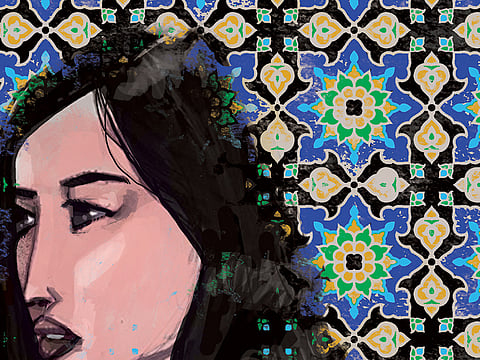Strangers, even to one another
Exiled from its Iranian homeland, a family seeks its identity in stories

Disoriental
By Negar Djavadi, Europa Editions, 338 pages, $18
Exile and immigration, terms often used interchangeably, are dissimilar in one key aspect: Exile, brought on by inevitability and not by choice, lacks the agency so essential to immigration. Having been banished from her home, an exile must find her way in the aftermath of her own disappearance.
In her remarkable novel, Disoriental, Negar Djavadi — an Iranian writer who fled her native country after the 1979 revolution and settled in Paris — beautifully captures the “disorientation” of exile and the attempt to reconstruct a self through family stories. Her book spans four generations of the Sadrs, from the great-grandfather Montazemolmolk, a feudal landowner in Mazandaran, to his daughter Nour, to Nour’s six sons, among them Darius, the father of Kimia, the narrator.
We first encounter Kimia in the drab waiting room of a fertility clinic in Paris. Huddled with anxious couples in a dejected atmosphere of childlessness, she recounts her family’s story, enveloped within the history of Iran. A sense of estrangement was commonplace among the Sadrs long before their geographic displacement from Tehran. Montazemolmolk, whose lands are confiscated following the collapse of the Qajar dynasty, settles in Qazvin and writes poems about exile. His descendant Darius, a political activist, has a penchant for vanishing. “We lived alongside him,” his daughter writes, “grew, ate, passed our tests, opened the front door, got sick, earned our diplomas, and closed the front door without him really being aware of it.” Darius’s brother, known as Uncle Number Two, keeper of the family mythology, is “trapped in a lie”: Married with children, he is homosexual in a country where homosexuality is the ultimate aberration. Kimia, a tomboy, is treated as an imaginary son by her father, who lectures her on Marx and Engels while shaving. And at times Iran is an entire culture that is estranged from itself, enchanted by all things Western, particularly French. In one of the book’s funniest passages, we meet a French-educated gynecologist whose claim to fame is his use of the French word “vagin” to “designate that intimate part of the female anatomy that Persians, prudish and reserved, never mentioned by name.”
But while from Tehran everything in France, “from its politics to the smell of the shampoo,” seems wonderful, the reality of being transplanted to Paris is far less so. At the French Embassy in Istanbul, where the Sadrs are belittled after their escape from Iran, Kimia understands that “Hugo and Voltaire and Rousseau and Sartre, around whom our lives had gravitated, were nothing but a Middle Eastern fiction.” In Paris, where the family turns “into strangers, not only to other people, but to one another,” she retreats into silence, turning to punk music, itinerancy and drugs. She sees the senselessness of the word “integrate”, so often commanded to newcomers, because “to really integrate into a culture, I can tell you that you have to disintegrate first, at least partially, from your own.”
If there is one element weighing down this rich novel (translated from the French by Tina Kover), it’s the exiled narrator’s compulsion to explain so much of her country’s past. The book contains not only extensive historical passages but also footnotes, which, as Kimia says, “will save you the trouble of looking it up on Wikipedia.” But is it the job of a novel to engage in such overt exposition? And if it is, must it then be assessed with the same scrutiny reserved for a scholarly work? I struggled with this question as I read passages that at times seemed oversimplified, as when Kimia contends that “no Western observer, none of the pundits who claimed to be experts on the Near and Middle East, made the effort to see this revolution as a protest movement by intellectuals.”
But perhaps explaining a lost world is part of any exile’s initial burden, until there comes a day when she feels she no longer has to.
–New York Times News Times
Dalia Sofer is the author of the novel The Septembers of Shiraz.


